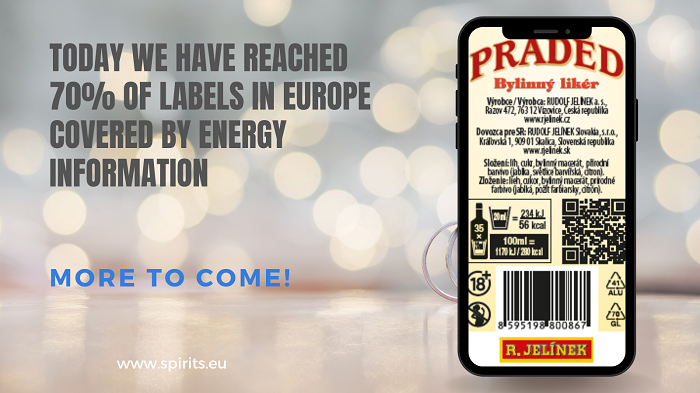
spiritsEUROPE members celebrate 5 successful years of delivering on their commitment to provide energy information on labels while making ingredient lists available via bespoke, product-specific e-labels. According to our latest Progress Report, more than 70% of total volumes of spirits put on the EU market are now released in bottles featuring energy-information on-pack. In parallel, the share of products with QR codes to access e-labels is rising fast and expected to reach similar levels by the end of 2025.
The accomplishments are part of a multiannual voluntary agreement, known as the Memorandum of Understanding (MoU) on Consumer Information, which was facilitated by the European Commission in 2019. The MoU offers clear guidance to producers on how to make nutrition information and ingredient listings available to consumers for spirit drinks (which are not mandatory under current EU regulation).
We strongly believe that with 5 years of implementation, the MoU is a tried and tested approach that has made a real difference in terms of consumer information on the ground and has successfully mobilised a growing number of producers large and small.
The year 2023 may well be labelled as the year when digital consumer information took off for real: in Spain, we saw the share of spirit drinks with QR codes rise rapidly from 18% to 31% in a matter of just eight months. The future is clearly digital – and the MoU approach demonstrates how digital technology can sensibly be integrated into a labelling context.
As far as large international company signatories are concerned, they were among the first movers in terms of MoU roll-out and today – with 83% – they report the highest share of energy on-pack compliance. At the same time, 2023 saw a fast-growing number of small and medium-sized producers start to implement the MoU. This shows that our approach is working across the entire sector.
Looking ahead, we call on the EU to integrate our self-regulation approach into the EU Regulation on Food Information to Consumers (FIC) when being revised, to ensure all alcoholic beverages are subject to the same rules.